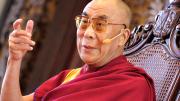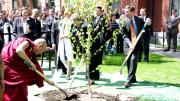His Holiness the Dalai Lama spoke to a capacity crowd at Harvard's Memorial Church on April 30, as the guest of the Harvard Divinity School and the Harvard Graduate School of Education. The visit had been so eagerly anticipated that members of the University community entered a lottery for tickets to his talk. Those fortunate enough to find themselves in the pews witnessed an opening performance of dance and song by eight dancers in long dresses, colorful serape-like blankets, and beaded headdresses. A solo musician accompanied them on the Tibetan piwong, a two-stringed instrument related to the violin, and the eight-string Tibetan mandolin. There was also a sounding of the long horn, a sacred Tibetan instrument that welcomes people to a religious ceremony. After removing his shoes and pulling his feet up on his chair beneath his crimson robe, the Dalai Lama discussed "Educating the Heart."
A central theme was the Buddhist virtue of compassion. The Dalai Lama enumerated a lengthy list of ways in which people differ from each other (age, sex, race, etc.), but stressed that "fundamentally, there are no differences," and that we must practice compassion for each other. "By nature, the human brain is potential," he said. "By nature, we all have compassion. Material prosperity alone is not enough. Education alone is not enough. Is there another alternative?"
He spoke of a fellow Tibetan monk who cited a danger he faced during 18 years as a prisoner of the Chinese: "Danger of losing compassion for the Chinese." The Dalai Lama expanded this idea to the notion of "compassion for your so-called enemy. Compassion now looks very useful and very important." (In an ironic coincidence, Harvard's Fairbank Center for Chinese Studies kicked off a four-day scholarly conference, “The People's Republic of China at 60: An International Assessment," on the evening of the Tibetan leader’s visit to campus.)
One question from those submitted by the audience asked, “Have you ever doubted your faith?" The Dalai Lama began with a simple, amused "No." He then explained that "Buddha made it very clear that 'My followers should not accept my teachings out of faith, but out of investigating for themselves.' " Another questioner asked whether, if His Holiness had the military might of the United States, he would use it to defend the Tibetans. The Dalai Lama provoked laughter with his facetious response: "If I had that power, I should act like Saddam Hussein." He spent some time explaining that anyone who commits violence will have to deal with the consequences of that violence: "Killing your so-called enemy, you have a problem. When there are 100 killed, more problems—1,000 killed, more problems."
After the talk, the Dalai Lama went outdoors to plant a tree ceremonially in commemoration of his visit. Divinity dean William A. Graham and education dean Kathleen McCartney wielded shovels alongside him, as did President Drew Faust, who called the tree—a hybrid of a monarch birch from Asia and a paper birch from North America, created especially for the occasion at the Arnold Arboretum—“a reminder of our interdependence." The Dalai Lama used the sapling as an occasion to speak about ecology. "Ecology is unlike war," he said. "War has images of dying and destruction, but [destruction of] ecology happens invisibly, silently. Taking care of ecology should be part of our daily life."










